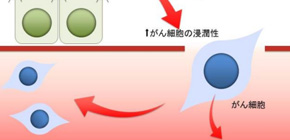
Metabolite that promotes cancer cell transformation and colorectal cancer spread identified
Metabolite found that makes colorectal cancer cells more invasive and increases likelihood of spread to distant organs
Cancer cells exhibit a range of properties that diverge from those of their normal healthy counterparts, including levels of various metabolites. However, it has been difficult to determine whether such altered levels is a cause or a consequence of the cancerous growth.
In a breakthrough that offers hope for improved treatment of colorectal cancer, Osaka University researchers have identified a metabolite that causes cancer cells to develop more dangerous properties and increases the likelihood that cancer will spread in colorectal cancer patients.
The team examined different varieties of cancer cells and cells from normal tissues and revealed high levels of D-2-hydroxyglutarate (D-2HG) in colorectal cancer cells. They then administered either D-2HG into cancer cells and found it induced the cells to undergo transformation. This transformation involved the cells adhering less strongly to each other and migrating more easily. These properties in the body are associated with cancer progression and spread.
"When we grew the cells with D-2HG on plates and measured their movement, they migrated further than untreated cells" lead author Hugh Colvin says. "Using a Matrigel assay that models the ability of cancer cells to enter local tissue, the D-2HG treated cells were also more invasive."
The researchers showed that D-2HG acts by increasing the expression of a gene called ZEB1, which promotes this cell transformation. They also obtained specimens from 28 human colorectal cancer patients and divided them into two groups with low or high levels of D-2HG. The patients' records showed that the high group had more often suffered cancer spread to distant organs, which suggested the importance of D-2HG in patient prognosis.
"When cancer cells initially emerge, it can be difficult for them to survive and multiply because of the local conditions," coauthor Hideshi Ishii says. "D-2HG makes cancer cell survival more likely by causing them to transform from epithelial to mesenchymal cells, meaning that they can invade local tissue, enter the blood, and be transported elsewhere to establish a new tumor."
With the importance of this molecule in cancer progression and prognosis revealed, it can be focused on as a promising target for colorectal cancer treatments.
Abstract
Deranged metabolism is a hallmark of cancer, playing a significant role in driving the disease process. One such example is the induction of carcinogenesis by the oncometabolite D-2 hydroxyglutarate (D-2HG), which is produced by the mutated enzyme isocitrate dehydrogenase (IDH) occurring in subsets of leukaemias and brain tumours. The oncogenic property of D-2HG appears to stem from its ability to interfere with the activities of α-ketoglutarate-dependent dioxygenases, including the Jumonji family histone demethylases. Here, we find in colorectal cancer cells that even in the absence of IDH mutation, the levels of D-2HG and its enantiomer L-2HG were elevated through glutamine anaplerosis. D-2HG, but not L-2HG, increased the trimethylation of histone H3 lysine 4 of the promoter region of ZEB1, a master regulator of epithelial-mesenchymal transition (EMT), and increased the expression of the ZEB1 gene to directly induce EMT in colorectal cancer cells. EMT promotes the ability of cancer cells to invade the local tissue and enter into the bloodstream, leading to distant organ metastasis. D-2HG levels were elevated in colorectal cancer specimens, particularly in those associated with distant metastasis, supporting the observations in vitro and implicating the contribution of D-2HG in metastasis, the major cause of death in this disease.

Figure. The production of oncometabolite (D-2HG) from glutamine results in invasion of cancer cells into the blood stream and spread to distant organs.
To learn more about this research, please view the full research report entitled “ Oncometabolite D-2-Hydroxyglurate Directly Induces Epithelial-MesenchymalTransition and is Associated with Distant Metastasis in Colorectal Cancer ” at this page of the Scientific Reports website.
Related link
